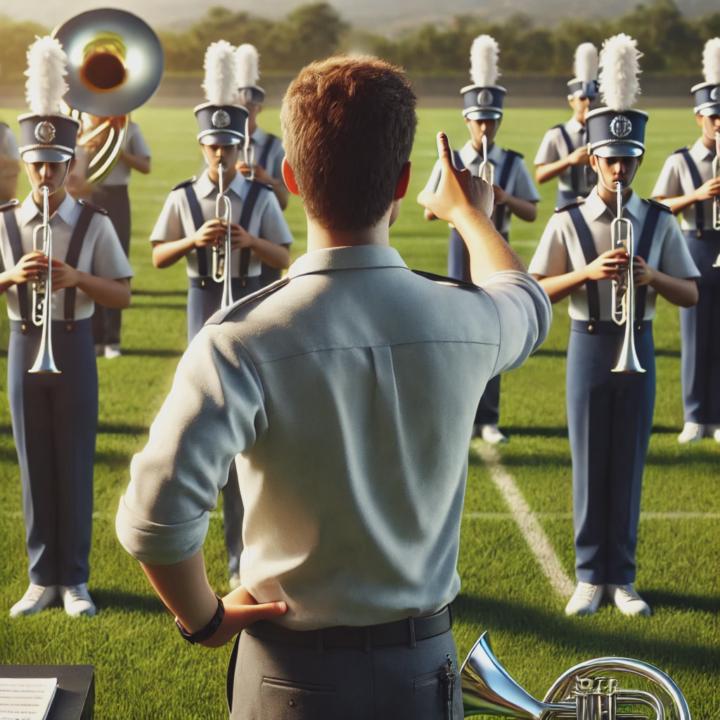Activity
Mon
Wed
Fri
Sun
Feb
Mar
Apr
May
Jun
Jul
Aug
Sep
Oct
Nov
Dec
Jan
What is this?
Less
More
Owned by Brian
🎺UNLOCK your ELITE band potential! TRANSFORM your performance & BOOST leadership with this EXCLUSIVE marching band community.🎉
A place where music directors trade ideas, save time, and bring music to life.
Memberships
The VFX Lab
169 members • $29/month
AI with Brittany Long
1.7k members • Free
WeScale (Free)
24.3k members • Free
Shop Success Central
222 members • Free
CatalystPlan
102 members • $10/m
Midjourney Experience Academy
78 members • $47/m
Creators
16.3k members • Free
7 contributions to Marching Band Vibes 💯
🎯 13 Ways to Instantly Improve Your Marching Band
Great marching bands don’t just sound good—they move with purpose, play with passion, and practice with precision. Whether you're a director looking to refine your program or a student hoping to elevate your section, these 13 quick wins will help you improve your marching band today. 1. Focus on Integration Stop separating music, marching, and movement. Great performances happen when students learn to combine all three seamlessly. Try to integrate them as early in the season as possible. 2. Practice Breathing Breathing exercises aren’t just for vocalists! Controlled breathing improves tone, stamina, and synchronization during performances. 3. Use Visual Counts Tie visual movements directly to counts and music. This boosts timing, memory, and synchronization—especially for complex drills. 4. Don’t Wait to Clean Cleaning isn’t just a “later” task. Start refining early. Identify mistakes and correct them before they become habits. 5. Set Daily Goals Make every rehearsal count with a clear goal. Whether it's fixing one set, nailing a tempo change, or perfecting horn angles—small wins compound into big results. 6. Prioritize Rehearsal Design Structure matters. Plan rehearsals to flow smoothly: warm-up → fundamentals → drill/movement → ensemble. Don’t waste time winging it. 7. Rehearse Transitions Transitions are where many performances fall apart. Practice getting into and out of sets—not just holding positions. 8. Work Smarter, Not Just Harder Don’t drill endlessly without reflection. Give students time to process, review, and adjust between reps. 9. Simplify the Complex Don’t overwhelm your band with too much info at once. Break down drill sets and musical phrases into manageable chunks. 10. Establish Vocabulary Make sure everyone’s speaking the same language—especially new members. Define terms like "set," "dot," or "interval" early and often. 11. Build Visual Memory Help students visualize their paths and sets. Use field markings, grids, or physical cues to improve spatial memory.
0
0

🎖 Leadership That Hits the Right Note: Marching Band Edition
In marching band, leadership isn’t just about calling commands or waving a baton. It’s about service, listening, and lifting others up while maintaining discipline and pride. Whether you're a section leader, drum major, or aspiring to lead, mastering these skills is what separates good bands from great ones. Here are some of the most valuable leadership tips drawn straight from the marching field—shared by real band members who’ve been in your shoes. 1. Lead with Kindness and Patience The most impactful leaders aren’t the loudest—they’re the ones who care. Leading your section isn’t about barking orders or being “the boss.” It’s about helping others get better. When a bandmate messes up, don’t call them out in front of everyone. Correct with kindness, show them the ropes, and be willing to repeat instructions without frustration. Growth takes time, and great leaders know how to nurture it. 2. Stay Humble, Always Just because you have a title doesn’t mean you’re better than anyone else. You’re a leader because of how you serve—not how you shine. Don’t use your position to show off. Be approachable. Be someone your team wants to work with, not someone they feel pressured by. Leadership is about influence, not ego. 3. Be a Good Listener Great leaders talk less and listen more. If someone in your section is struggling or frustrated, really hear them out. You’re their first line of support. And sometimes, the most valuable thing you can do isn’t fixing a musical issue—it’s encouraging a teammate to keep going. 4. Take Initiative Without Micromanaging If something needs doing—do it. Don’t wait for permission. Whether it's cleaning up after rehearsal, calling out counts, or helping someone learn a set, your initiative builds trust. But don’t hover or try to control every movement. Empower your team to be responsible, too. 5. Stay Focused, No Matter What Band rehearsals can get chaotic. Weather, energy dips, off-days—they happen. A strong leader stays steady. You keep your cool, show up on time, and give 100% every time. Even when others slack off, you hold the line. Your consistency sets the tone for everyone else.
0
0

🥁 Level Up Your Marching Band Rehearsals: 6 Game-Changing Tips
Whether you're a seasoned band director or a drum major leading your peers, improving rehearsal efficiency is key to leveling up your performance on the field. Great performances don’t happen by chance—they’re built during focused, intentional rehearsals. Here are six practical strategies to help you take your marching band practice sessions to the next level. 1. Rehearse with Purpose Every minute of rehearsal should have a clearly defined goal. Instead of just “running through the show,” decide in advance what aspect of the performance you’re refining—whether it’s posture, spacing, or timing. Communicate that goal to your band so everyone’s on the same page. When the band knows what you’re aiming for, they can commit their energy in the right direction. 2. Establish Rehearsal Expectations Discipline is a form of love in band culture. From the first day, establish what’s expected: punctuality, posture, attention, and effort. Set a high standard and enforce it consistently—but with empathy. When everyone understands the expectations, it creates a safe and focused space where real progress can happen. 3. Master the Art of Silence One of the biggest rehearsal killers? Too much talking. The best-run rehearsals have clear, concise communication and minimal downtime. Teach students how to listen actively and stay alert, even during breaks. Establish non-verbal signals for stopping and resetting. The less you speak, the more they play—and improve. 4. Use a Rehearsal Sequence Create a consistent structure for every practice. For example: warm-up ➡️ basics block ➡️ music sectionals ➡️ visual work ➡️ ensemble run. This predictable rhythm builds comfort and flow. It also makes it easier to track progress from day to day. Consistency leads to confidence. 5. Be Flexible & Adaptable Things will go wrong—weather changes, unexpected absences, or tech issues. A great band leader rolls with it. Always have a backup plan, and keep your attitude positive. Flexibility shows your members that it’s okay to adjust and pivot, as long as the focus remains on growth.
0
0

🚨 If You Know, You Know...
Inside jokes only band people will understand.😂 Drop your best ‘band-only’ meme, quote, or inside joke. Let’s see who gets it!
0
0
🌩 Most Intense Weather You Marched In
Rain? Snow? Blazing heat?💬 Tell the tale of the craziest weather you performed in—and how you powered through it.
0
0
1-7 of 7
Active 7d ago
Joined Apr 9, 2025
Powered by
